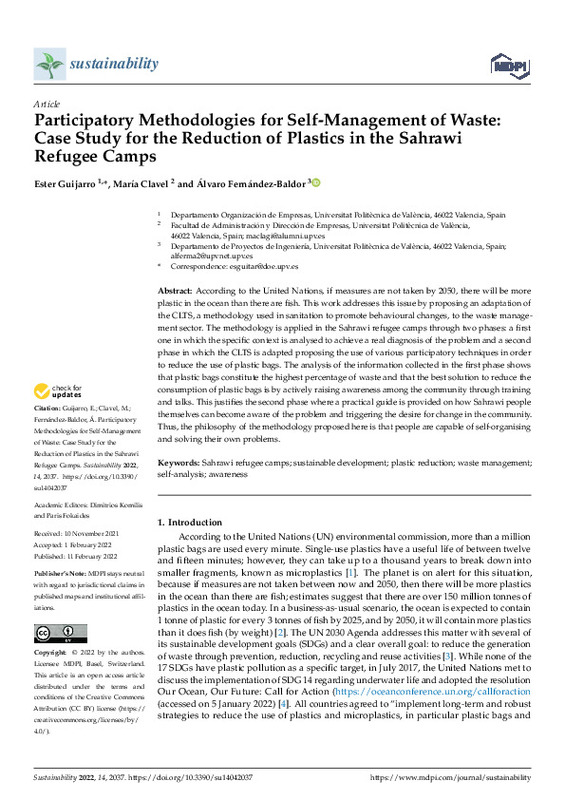JavaScript is disabled for your browser. Some features of this site may not work without it.
Buscar en RiuNet
Listar
Mi cuenta
Estadísticas
Ayuda RiuNet
Admin. UPV
Participatory Methodologies for Self-Management of Waste: Case Study for the Reduction of Plastics in the Sahrawi Refugee Camps
Mostrar el registro sencillo del ítem
Ficheros en el ítem
| dc.contributor.author | Guijarro, Ester
|
es_ES |
| dc.contributor.author | Clavel, María
|
es_ES |
| dc.contributor.author | Fernández-Baldor, Álvaro
|
es_ES |
| dc.date.accessioned | 2023-10-25T18:02:22Z | |
| dc.date.available | 2023-10-25T18:02:22Z | |
| dc.date.issued | 2022-02 | es_ES |
| dc.identifier.uri | http://hdl.handle.net/10251/198808 | |
| dc.description.abstract | [EN] According to the United Nations, if measures are not taken by 2050, there will be more plastic in the ocean than there are fish. This work addresses this issue by proposing an adaptation of the CLTS, a methodology used in sanitation to promote behavioural changes, to the waste management sector. The methodology is applied in the Sahrawi refugee camps through two phases: a first one in which the specific context is analysed to achieve a real diagnosis of the problem and a second phase in which the CLTS is adapted proposing the use of various participatory techniques in order to reduce the use of plastic bags. The analysis of the information collected in the first phase shows that plastic bags constitute the highest percentage of waste and that the best solution to reduce the consumption of plastic bags is by actively raising awareness among the community through training and talks. This justifies the second phase where a practical guide is provided on how Sahrawi people themselves can become aware of the problem and triggering the desire for change in the community. Thus, the philosophy of the methodology proposed here is that people are capable of self-organising and solving their own problems. | es_ES |
| dc.language | Inglés | es_ES |
| dc.publisher | MDPI AG | es_ES |
| dc.relation.ispartof | Sustainability | es_ES |
| dc.rights | Reconocimiento (by) | es_ES |
| dc.subject | Sahrawi refugee camps | es_ES |
| dc.subject | Sustainable development | es_ES |
| dc.subject | Plastic reduction | es_ES |
| dc.subject | Waste management | es_ES |
| dc.subject | Self-analysis | es_ES |
| dc.subject | Awareness | es_ES |
| dc.subject.classification | ORGANIZACION DE EMPRESAS | es_ES |
| dc.subject.classification | PROYECTOS DE INGENIERIA | es_ES |
| dc.title | Participatory Methodologies for Self-Management of Waste: Case Study for the Reduction of Plastics in the Sahrawi Refugee Camps | es_ES |
| dc.type | Artículo | es_ES |
| dc.identifier.doi | 10.3390/su14042037 | es_ES |
| dc.rights.accessRights | Abierto | es_ES |
| dc.contributor.affiliation | Universitat Politècnica de València. Facultad de Administración y Dirección de Empresas - Facultat d'Administració i Direcció d'Empreses | es_ES |
| dc.contributor.affiliation | Universitat Politècnica de València. Escuela Técnica Superior de Ingenieros Industriales - Escola Tècnica Superior d'Enginyers Industrials | es_ES |
| dc.description.bibliographicCitation | Guijarro, E.; Clavel, M.; Fernández-Baldor, Á. (2022). Participatory Methodologies for Self-Management of Waste: Case Study for the Reduction of Plastics in the Sahrawi Refugee Camps. Sustainability. 14(4):1-17. https://doi.org/10.3390/su14042037 | es_ES |
| dc.description.accrualMethod | S | es_ES |
| dc.relation.publisherversion | https://doi.org/10.3390/su14042037 | es_ES |
| dc.description.upvformatpinicio | 1 | es_ES |
| dc.description.upvformatpfin | 17 | es_ES |
| dc.type.version | info:eu-repo/semantics/publishedVersion | es_ES |
| dc.description.volume | 14 | es_ES |
| dc.description.issue | 4 | es_ES |
| dc.identifier.eissn | 2071-1050 | es_ES |
| dc.relation.pasarela | S\455361 | es_ES |
| dc.contributor.funder | Universitat Politècnica de València | es_ES |
| dc.subject.ods | 11.- Conseguir que las ciudades y los asentamientos humanos sean inclusivos, seguros, resilientes y sostenibles | es_ES |
| dc.subject.ods | 13.- Tomar medidas urgentes para combatir el cambio climático y sus efectos | es_ES |
| dc.subject.ods | 14.- Conservar y utilizar de forma sostenible los océanos, mares y recursos marinos para lograr el desarrollo sostenible | es_ES |
| dc.subject.ods | 15.- Proteger, restaurar y promover la utilización sostenible de los ecosistemas terrestres, gestionar de manera sostenible los bosques, combatir la desertificación y detener y revertir la degradación de la tierra, y frenar la pérdida de diversidad biológica | es_ES |
| upv.costeAPC | 1700 | es_ES |








